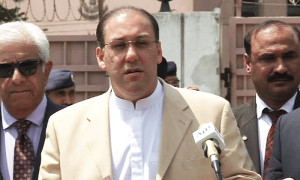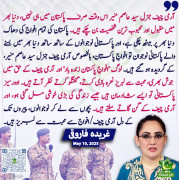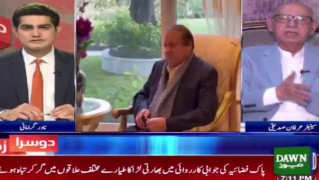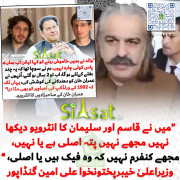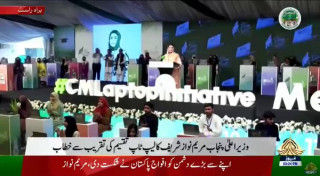mehwish_ali
Chief Minister (5k+ posts)
Dear Mahwish, following is the Hadeeth in Sahih Muslim you are quoting:
Anas reported: A man came panting and entered the row of worshippers and said: Praise be to Allah, much praised and blessed. When the Messenger of Allah (may peace be upon him) finished the prayer he said: Who amongst you uttered these words? The people remained silent. He (the Holy Prophet again said) -: Who amongst you uttered these words? He said nothing wrong. Then a man said: I came and had a difficulty in breathing, so I uttered them. He replied: I saw twelve angels facing one another as to who will take them up (to Allah). (Sahih Muslim Book #004, Hadith #1247)
A similar hadith is also available in Sahih Bukhari:
Narrated Rifa'a bin Rafi AzZuraqi: One day we were praying behind the Prophet. When he raised his head from bowing, he said, "Sami'a-l-lahu Liman hamida." A man behind him said, "Rabbana walaka-l hamd hamdan Kathiran taiyiban mubarakan fihi" (O our Lord! All the praises are for You, many good and blessed praises). When the Prophet completed the prayer, he asked, "Who has said these words?" the man replied, "I." the Prophet said, "I saw over thirty angels competing to write it first." Prophet rose (from bowing) and stood straight till all the vertebrae of his spinal column came to a natural position. (Sahih Bukhari, Book #12, Hadith #764)
No Muslim says that uttering these words " Praise be to Allah, much praised and blessed " is biddat (بدعت). The biddat (even Shirk) is that if somebody start uttering "Ya Ghaus ul Azam" , "Ya Ali" etc.
It is very clear from above Hadeeths that the person was uttering the words alone while praying inside a mosque. Since Prophet Muhammad (صلی اللہ علیہ وآلہ وسلم) approved it, then and there, hence these words may be said after saying "Sami'a-l-lahu Liman hamida".
I have personally experienced a biddat. Some of Muslims now a days, utter words like "Allah hoo" in groups in chorus, inside a room with all lights off and at the same time shaking their head (and body) up and down. That would be called biddat.
Furthermore, during the life of Prophet Muhammad (صلی اللہ علیہ وآلہ وسلم), he (صلی اللہ علیہ وآلہ وسلم) himself was there to correct Muslims if they were going towards wrong direction. Prophet Muhammad (صلی اللہ علیہ وآلہ وسلم) has completely delivered the religion before he (صلی اللہ علیہ وآلہ وسلم) died. After his (صلی اللہ علیہ وآلہ وسلم) death there is nobody to correct if somebody is taking a wrong path, except Quraan and Sunnah.
In the end, I would like to say that, please leave this beautifull and simple religion Islam free of pollution like URS, Milad, Tazias, qawalis etc. and follow just Quraan and Sunnah because after the death of Prophet Muhammad nobody can claim that he is capable of inventing something in religion Islam which was missed by Prophet Muhammad (صلی اللہ علیہ وآلہ وسلم) (Nauzobillah).
آپ سے درخواست ہے کہ آپ میرا مراسلہ آنکھیں کھول کر پڑھئیے۔ میں نے ہرگز یہ روایت نقل نہیں کی ہے، بلکہ ذیل کی روایت نقل کی ہے۔
سمجھ نہیں آتا کہ یہ لوگ بدعت کے نام پر کس طرح نفلی عبادات (جیسا کہ ذکر) کو حرام بنا دیتے ہیں۔ کتنی شرمناک بات ہے کہ انکے علماء کو اچھی طرح سے پتا ہے کہ اللہ اور اسکے رسول کے متعلق ہر محفل میں ذکر کرنے کے متعلق انتہائی مستند احادیث موجود ہیں، مگر انکے علماء ان سب کو چھپاتے ہیں تاکہ ہر جگہ شرک و بدعت کے فتوے جاری کر سکیں۔
قیصر مرزا بھائی صاحب، آپ سے درخواست ہے کہ آنکھیں کھول کر ذکر کی محفلوں کے متعلق فقط ایک یہ روایت پڑھ لیں۔ حق راہ کو پانے کے لیے یہ ایک روایت کافی ہے اگر آپ واقعی حق کے متلاشیوں میں سے ہیں۔ اور اگر ہٹ دھرمی کرنی ہے تو الگ بات ہے۔
صحیح مسلم، کتاب الذکر و الدعاء (آنلائن لنک)
سیدنا ابو سعید خدریؓ کہتے ہیں کہ سیدنا معاویہؓ نے مسجد میں (لوگوں کا) ایک حلقہ دیکھا تو پوچھا کہ تم لوگ یہاں کیوں بیٹھے ہو؟ وہ بولے کہ ہم اللہ تعالیٰ کا ذکر کرنے بیٹھے ہیں۔ سیدنا معاویہؓ نے کہا اللہ کی قسم! کیا تم اسی لئے بیٹھے ہو؟ انہوں نے کہا کہ اللہ کی قسم! صرف اللہ کے ذکر کے لئے بیٹھے ہیں۔ سیدنا معاویہؓ نے کہا کہ میں نے تمہیں اس لئے قسم نہیں دی کہ تمہیں جھوٹا سمجھا اور میرا رسول اللہﷺ کے پاس جو مرتبہ تھا، اس رتبہ کے لوگوں میں کوئی مجھ سے کم حدیث کا روایت کرنے والا نہیں ہے (یعنی میں سب لوگوں سے کم حدیث روایت کرتا ہوں)۔ ایک دفعہ رسول اللہﷺ اپنے اصحاب کے حلقہ پر نکلے اور پوچھا کہ تم کیوں بیٹھے ہو؟ وہ بولے کہ ہم اللہ جل و علا کی یاد کرنے کو بیٹھے ہیں اور اس کی تعریف کرتے ہیں اور شکر کرتے ہیں کہ اس نے ہمیں اسلام کی راہ بتلائی اور ہمارے اوپر احسان کیا۔ آپﷺ نے فرمایا، اللہ تعالیٰ کی قسم! تم اسی لئے بیٹھے ہو؟ وہ بولے کہ اللہ کی قسم! ہم تو صرف اسی واسطے بیٹھے ہیں۔ آپﷺ نے فرمایا کہ میں نے تمہیں اس لئے قسم نہیں دی کہ تمہیں جھوٹا، سمجھا بلکہ میرے پاس جبرئیل علیہ السلام آئے اور بیان کیا کہ اللہ تعالیٰ تمہاری وجہ سے فرشتوں میں فخر کر رہا ہے۔
چنانچہ ثابت ہوا کہ:
1. یہ صحابہ کرام اپنی مرضی سےمحفل میں حلقے بنا کر "ذکر" کر رہے تھے۔
2. اللہ کے رسول نے انہیں ایسا کرنے کا براہ راست کوئی حکم نہیں دیا تھا، بلکہ یہ صحابہ کرام کا اپنا اجتہاد تھا کہ بنیادی اصول اللہ کا ذکر کرنا ہے اور اسکا طریقہ یعنی محفل بنا کر ذکر کرنا عین مباح فعل ہے اور اسلام کی کسی بنیادی اصول سے نہیں ٹکراتا ہے۔
3. اس ذکر کی محفل کے "وقت" کا تعین بھی ان صحابہ نے اپنی مرضی سے کیا تھا کیونکہ انہیں علم تھا کہ شریعت کا کوئی ایسا اصول نہیں ہے جو ایسے اوقات میں ذکر کی محفل کرنے کو حرام ٹہراتا ہے۔
4. اور جب اللہ کے رسول ﷺ کو صحابہ کرام کے اس "نئے"نفلی عباداتی فعل کا علم ہوتا ہے تو آپ ﷺ اس پر بدعت و ضلالت کا فتویٰ لگانے کی بجائے ان صحابہ کرام کو فرماتے ہیں کہ اللہ تعالی انکے اس "نئے فعل" کی وجہ سے فرشتوں میں فخر کر رہا ہے۔





